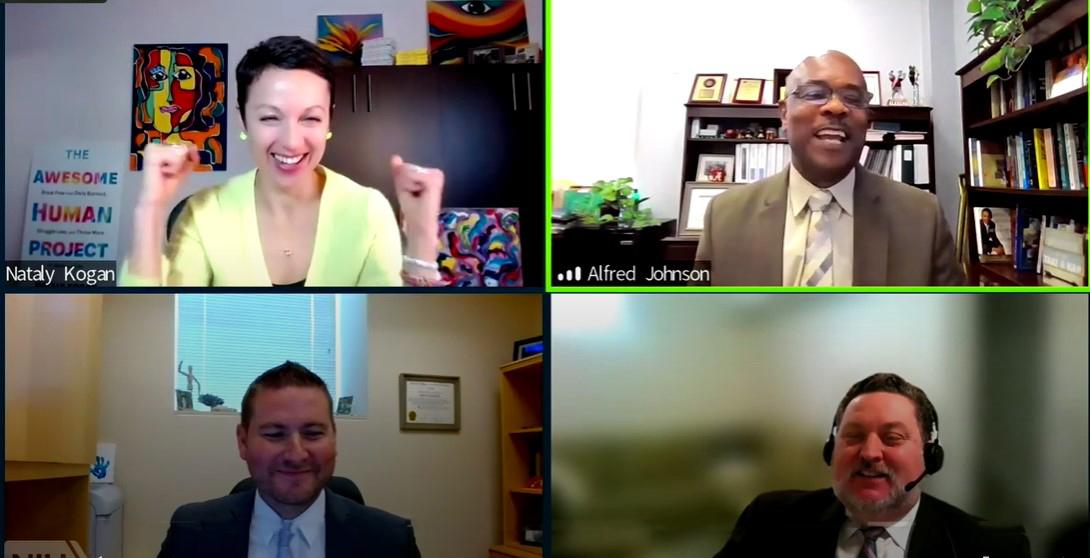Supporting Yourself
Kogan Offers Practical Tips for Challenging Times

Nataly Kogan appeared to be on top of the world. A successful businesswoman, she kept the illusion going for 20 years. But behind her smiling, confident exterior, Kogan was struggling. Overwhelmed and unfulfilled, she ultimately suffered a debilitating burnout.
“It was the darkest, most painful experience in my life as a mom, first and foremost, but also as a colleague and a leader,” said Kogan. “I was running a company that I built and I couldn’t function at work and I came close to losing everything that was meaningful to me.”
Over time, Kogan learned a hard lesson: “Trying to force yourself to feel good when you don’t or, worse, pretending to feel good…is draining,” she said at the first Deputy Director for Management (DDM) seminar of the 2022 series.
Something had to change, she realized, beginning with her mindset. “If I wanted to continue to do work that was meaningful,” she said, “I had to create a more supportive relationship with myself.”
Kogan then began a journey to train her brain to rest, reset and refuel. Now, the founder of Happier, a tech learning platform designed to improve well-being, Kogan helps others embark on a path of emotional fitness.
It takes practice and an open mind.
“Emotional fitness is a skill of creating this supportive relationship with yourself, your thoughts, your emotions and other people so that when you have to go through change, challenge and uncertainty, you know how to support yourself through it,” said Kogan. By expending less energy on stressing and ruminating, “research shows we perform better across every category that is meaningful. We’re more productive, creative, collaborative.”
Editing Your Thoughts
We’re all biologically programmed to worry. The human brain is wired for survival—always scanning the environment, looking for danger, plotting what could go wrong.
Be aware of this, said Kogan, and practice deflecting these habitual negative thoughts. Question them. Is this thought true? Is it helpful toward moving forward?
“Be the editor of your thoughts,” Kogan urged. Push away the worst-case scenarios and pessimistic narratives, she advised, and try to shift to more productive thinking.
Rethinking Self-Care
For a long time, Kogan dismissed the idea of self-care, and when she discussed it with others, she heard similar objections: It’s an indulgence. Who has time?

“But when I completely neglected my self-care,” said Kogan, “what I brought to people in my life was a heavy kind of energy.” She was impatient, irritable, overwhelmed.
Then she discovered the crux of it all: “You cannot give what you do not have,” she said.
Think of an energy reservoir. Everyone begins each day with a limited supply of energy and each thought or task draws on the supply throughout the day. Self-care helps replenish it.
Take a break. Go for a walk. Have a cup of tea. Spend time on a hobby. Disconnect.
Kogan has come to view self-care as neither luxury nor reward but as a mental health necessity, and she makes time for it consistently.
“Recognize that self-care is not selfish,” she said. “Self-care is the greatest act of love and service you can give to the people you interact with.”
Reset and Refuel
While self-care fuels energy, one cannot fill a leaky bucket. To keep that reservoir stocked, do fewer things that unnecessarily drain your energy, said Kogan, who cited some familiar examples.
Mindlessly scrolling social media. Worrying. Making decisions—something we do all day but which need not be such a weighty chore. “Be aware of the energy you’re investing in making decisions,” said Kogan, “and, when possible…delegate.”

Another common energy drain is multi-tasking, which really is a misnomer. People cannot do two things at once that require their attention, Kogan pointed out.
“What we call multi-tasking is actually switch-tasking,” she said. “So for all of you trying to do your email while listening to me, you’re not listening to me. You’re switching rapidly.” And that is both draining and less efficient.
Also, Kogan underscored, don’t be so hard on yourself. Self-criticism is exhausting. “Talk to yourself as you would a friend,” she said. “Supporting yourself through challenging times fuels your energy and improves your motivation and focus.”
Rest and Reflect
Another way to refuel is simply to rest. Ever have a brilliant idea pop into your head in the shower? There’s science behind it. In that moment, your brain’s frontal cortex relaxed, allowing the areas in your brain responsible for creativity to engage.

“Only when we disconnect from the thinking and doing does our default modal network come fully online,” said Kogan. “When you take a break, you’re not doing nothing. Your brain is organizing, processing, making connections.”
So take a few moments to check in with yourself every day.
“One of the best investments I made in my emotional fitness when I was starting to recover,” she said, “was starting with 5 minutes of time every day just to be and reflect.”
Looking back, Kogan said she spent years on autopilot, powering through while ignoring the warning signs—the daily burnouts that left her constantly drained, the concerns of people close to her—and eventually hit the breaking point.
“If someone asks if you’re doing okay, pause. Be aware,” Kogan advised. Edit your thoughts. Take time for self-care. Regularly refuel. “Practice these skills before you get to [the breaking] point.”
